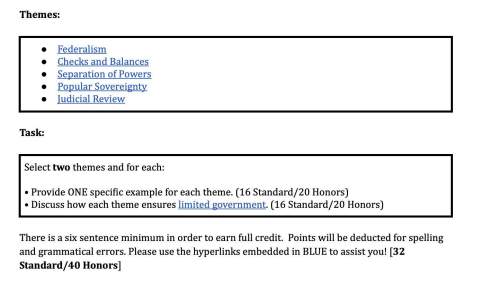
History, 12.02.2021 18:50 courtney3652
Physically speaking, we can not separate. We can not remove our respective sections from each other nor build an impassable wall between them. A husband and wife may be divorced and go out of the presence and beyond the reach of each other, but the different parts of our country can not do this. They can not but remain face to face, and intercourse, either amicable or hostile, must continue between them.” Abraham Lincoln First Inaugural Address, 1861 According to this excerpt Abraham Lincoln holds that -
A. Slavery should be allowed to spread to western territories
B. The Unites States should seek to acquire more land from Mexico
C. The 13 Colonies should not have seceded from Britain
D.Despite differences all our states must remain a part of the Union

Answers: 1


Another question on History

History, 21.06.2019 15:00
Which of the following is most likely the biggest result of the women’s rights movement
Answers: 1

History, 21.06.2019 17:00
In witch of these areas were the early bantu successful in part to there iron working skills ? check all that apply -agriculture -gathering -navigation -trade -warfare
Answers: 3

History, 21.06.2019 18:00
How did france social divisions on the late 1700s contribute to the french revolution
Answers: 1

History, 21.06.2019 19:30
In the decision for dred scott vs.sanford, (1857) in which a slave petitioned for his freedom in a st. louis court, on the grounds that his owner had taken him into free territory, and thus he ought no longer be regarded as possessing "slave" status, but should be regarded as a free man, the court decided as follows (excerpt): "in the circuit courts of the united states, the record must show that the case is one in which by the constitution and laws of the united states, the court had jurisdiction--and if this does not appear, and the court gives judgment either for plaintiff or defendant, it is error, and the judgment must be reversed by this court--and the parties cannot by consent waive the objection to the jurisdiction of the circuit court. a free negro of the african race, whose ancestors were brought to this country and sold as slaves, is not a 'citizen' within the meaning of the constitution of the united states. when the constitution was adopted, they were not regarded in any of the states as members of the community which constituted the state, and were not numbered among its 'people or citizen.' consequently, the special rights and immunities guarantied to citizens do not apply to them. and not being "citizens" within the meaning of the constitution, they are not entitled to sue in that character in a court of the united states, and the circuit court has not jurisdiction in such a suit. the only two clauses in the constitution which point to this race, treat them as persons whom it was morally lawful to deal in as articles of property and to hold as slaves. since the adoption of the constitution of the united states, no state can by any subsequent law make a foreigner or any other description of persons citizens of the united states, nor entitle them to the rights and privileges secured to citizens by that instrument." why does the court say that the petitioning party in this case had no right to sue for his freedom? a) because he is too young b) because he is from a different state c) because he is "of the african race" with enslaved ancestors d) because he is, properly speaking, within his owner's jurisdiction
Answers: 1
You know the right answer?
Physically speaking, we can not separate. We can not remove our respective sections from each other...
Questions

Geography, 28.01.2021 21:00

Mathematics, 28.01.2021 21:00

Mathematics, 28.01.2021 21:00

Mathematics, 28.01.2021 21:00


Health, 28.01.2021 21:00

Mathematics, 28.01.2021 21:00

History, 28.01.2021 21:00

Mathematics, 28.01.2021 21:00

History, 28.01.2021 21:00

Chemistry, 28.01.2021 21:00

Mathematics, 28.01.2021 21:00


Arts, 28.01.2021 21:00

Mathematics, 28.01.2021 21:00



Health, 28.01.2021 21:00


Mathematics, 28.01.2021 21:00




